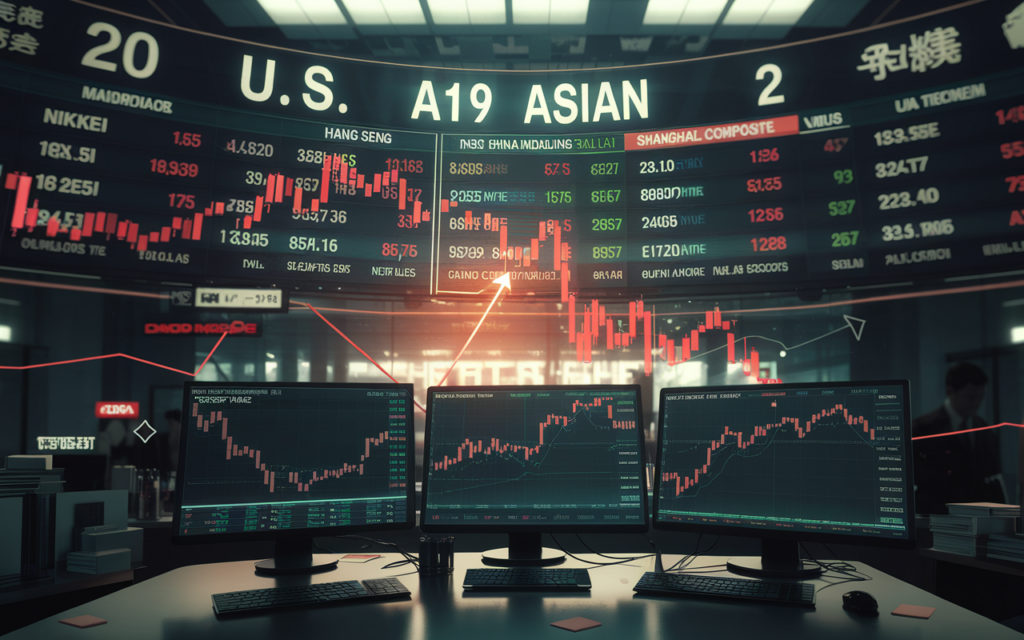Market Volatility Deepens as Trade Uncertainty and AI Competition Rattle Investors
Asian stock markets witnessed a sharp downturn on Tuesday, driven by escalating U.S.-China tensions and growing investor caution ahead of Nvidia’s much-anticipated earnings report. The technology sector faced heavy selling pressure, with chipmakers and AI-linked stocks leading the decline.
Adding to market unease, reports surfaced that the White House is preparing stricter regulations on semiconductor exports to China, further intensifying concerns about a potential technology decoupling between the world’s two largest economies. Meanwhile, U.S. President Donald Trump’s latest trade tariff threats against Canada and Mexico have further dampened risk sentiment across global markets.
Tech Selloff Hits Hong Kong & Japan as Nvidia Report Looms
Hong Kong’s Hang Seng Index plunged 2%, marking its worst daily performance in weeks as the recent AI-driven tech rally fizzled out. Investors locked in profits ahead of Nvidia’s earnings report, scheduled after the U.S. market closes on Wednesday.
The Japanese Nikkei 225 also retreated by 0.9%, weighed down by losses in semiconductor giants. Taiwan’s TSMC (TW:2330)—a key Nvidia supplier—dropped 1.4%, dragging the Taiwan Weighted Index lower.
The selloff mirrored declines on Wall Street, where Nvidia (NASDAQ: NVDA) tumbled over 3% overnight, as analysts questioned whether the AI boom could sustain the industry’s staggering valuations. The AI-driven rally, which had propped up global tech stocks, now faces growing skepticism following China’s DeepSeek AI launch in January, raising competition concerns.
China’s Shanghai Composite Index and CSI 300 Index dropped 0.5% and 0.9%, respectively, as Beijing braces for tighter U.S. restrictions on chip exports. The new measures, reportedly being drafted by Trump’s team, aim to further restrict Chinese access to cutting-edge U.S. technology, reigniting fears of a prolonged trade and tech war.
South Korea’s Market Decline Softened by Rate Cut
South Korea’s KOSPI fell 0.4%, faring better than its regional peers after the Bank of Korea (BOK) cut interest rates by 25 basis points. This marked the central bank’s third consecutive rate cut, signaling more easing ahead as the South Korean economy slows.
Despite the policy support, South Korean semiconductor stocks weren’t spared from the broader selloff. SK Hynix Inc (KS:000660), a major Nvidia supplier, declined by 2.2%, adding to concerns about the sector’s near-term outlook.
Buffett’s Big Bet Lifts Japanese Trading Firms Amid Market Slump
While most of Japan’s stock market slumped, select trading houses rallied sharply after legendary investor Warren Buffett announced plans to increase Berkshire Hathaway’s stakes in key Japanese firms.
Shares of Itochu Corp. (TYO:8001), Marubeni Corp. (TYO:8002), Mitsui & Co., Ltd. (TYO:8031), Sumitomo Corp. (TYO:8053), and Mitsubishi Corp. (TYO:8058) surged between 5% and 10%, defying the broader market downturn. Buffett’s continued interest in Japan’s leading trading firms reinforced confidence in their long-term growth potential amid global economic uncertainties.
Broader Market Trends: Australia & India Extend Losses
- Australia’s ASX 200 slipped 0.6%, extending its pullback from record highs earlier this month.
- Singapore’s Straits Times Index remained flat, as softer-than-expected inflation data provided little market direction.
- India’s Nifty 50 futures pointed to a weak open, as local stocks continue their downward trajectory amid rising concerns over slowing economic growth and potential U.S. tariffs on Indian exports.
Key Takeaways & Market Outlook
With Nvidia’s earnings looming large, uncertainty surrounding AI demand will play a crucial role in shaping the next market move. The escalating U.S.-China tech war, Trump’s tariff threats, and global economic headwinds continue to weigh heavily on investor sentiment.
As global investors brace for potential market volatility, the coming days could determine whether Nvidia’s results will reignite the AI rally—or confirm fears of a sector-wide cooldown. Meanwhile, interest rate cuts and geopolitical risks will remain key drivers for Asian stock performance in the near term.




